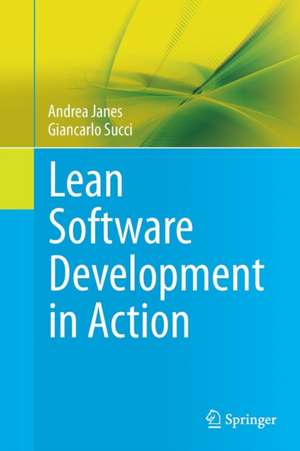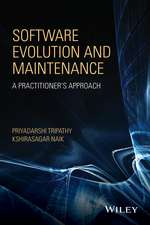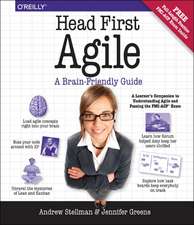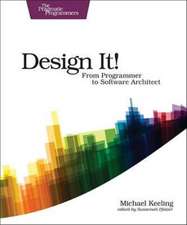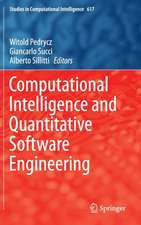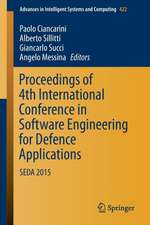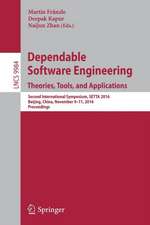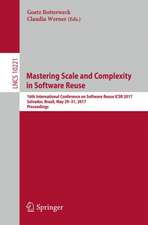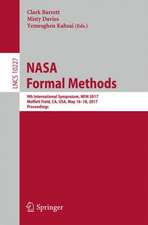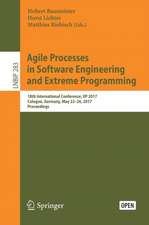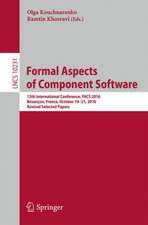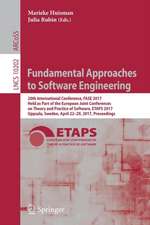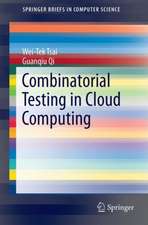Lean Software Development in Action
Autor Andrea Janes, Giancarlo Succien Limba Engleză Paperback – 23 aug 2016
In order to be successful, a Lean orientation of software development has to go hand in hand with a company’s overall business strategy. To achieve this, two interrelated aspects require special attention: measurement and experience management. In this book, Janes and Succi provide the necessary knowledge to establish “Lean software company thinking,” while also exploiting the latest approaches to software measurement. A comprehensive, company-wide measurement approach is exactly what companies need in order to align their activities to the demands of their stakeholders, to their business strategy, etc. With the automatic, non-invasive measurement approach proposed in this book, even small and medium-sized enterprises that do not have the resources to introduce heavyweight processes will be able to make their software development processes considerably more Lean.
The book is divided into three parts. Part I, “Motivation for Lean Software Development,” explains just what “Lean Production” means, why it can be advantageous to apply Lean concepts to software engineering, and which existing approaches are best suited to achieving this. Part II, “The Pillars of Lean Software Development,” presents the tools needed to achieve Lean software development: Non-invasive Measurement, the Goal Question Metric approach, and the Experience Factory. Finally, Part III, “Lean Software Development in Action,” shows how different tools can be combined to enable Lean Thinking in software development.
The book primarily addresses the needs of all those working in the field of software engineering who want to understand how to establish an efficient and effectivesoftware development process. This group includes developers, managers, and students pursuing an M.Sc. degree in software engineering.
| Toate formatele și edițiile | Preț | Express |
|---|---|---|
| Paperback (1) | 338.16 lei 6-8 săpt. | |
| Springer Berlin, Heidelberg – 23 aug 2016 | 338.16 lei 6-8 săpt. | |
| Hardback (1) | 344.60 lei 6-8 săpt. | |
| Springer Berlin, Heidelberg – 2 dec 2014 | 344.60 lei 6-8 săpt. |
Preț: 338.16 lei
Preț vechi: 422.70 lei
-20% Nou
Puncte Express: 507
Preț estimativ în valută:
64.71€ • 69.19$ • 53.95£
64.71€ • 69.19$ • 53.95£
Carte tipărită la comandă
Livrare economică 17 aprilie-01 mai
Preluare comenzi: 021 569.72.76
Specificații
ISBN-13: 9783662519059
ISBN-10: 3662519054
Pagini: 412
Ilustrații: XV, 393 p. 188 illus., 63 illus. in color.
Dimensiuni: 155 x 235 x 22 mm
Greutate: 0.58 kg
Ediția:Softcover reprint of the original 1st ed. 2014
Editura: Springer Berlin, Heidelberg
Colecția Springer
Locul publicării:Berlin, Heidelberg, Germany
ISBN-10: 3662519054
Pagini: 412
Ilustrații: XV, 393 p. 188 illus., 63 illus. in color.
Dimensiuni: 155 x 235 x 22 mm
Greutate: 0.58 kg
Ediția:Softcover reprint of the original 1st ed. 2014
Editura: Springer Berlin, Heidelberg
Colecția Springer
Locul publicării:Berlin, Heidelberg, Germany
Cuprins
Part I Motivation for Lean Software Development.- 1 Introduction.- 2 The Lean Revolution.- 3 Towards Lean Thinking In Software Engineering.- 4 Agile Methods.- 5 Issues in Agile Methods.- 6 Enabling Lean Software Development.- Part II The Pillars of Lean Software Development.- 7 The GQM+Strategies Approach.- 8 The Experience Factory.- 9 Non-Invasive Measurement.- Part III Lean Software Development in Action.- 10 The Integrated Approach.- 11 Lean software development in action.- 12 Conclusion.
Notă biografică
Andrea Janes is an Assistant Professor of Software Engineering at the Free University of Bolzano-Bozen, Italy. He holds a PhD in Computer Science (University of Klagenfurt, 2014) and a MSc in Business Informatics (Technical University of Vienna, 2001), has been passionate about programming for more than 25 years and has always found it interesting to combine aspects of Economics with aspects of Computer Science.
Giancarlo Succi is Professor of Software Engineering at the Free University of Bolzano-Bozen, Italy. Before joining the Free University of Bolzano-Bozen, he was Professor at the University of Alberta, Associate Professor at the University of Calgary, and Assistant Professor at the University of Trento. Giancarlo holds a Laurea degree in Electrical Engineering (Genova, 1988), an MSc in Computer Science (SUNY Buffalo, 1991), and a PhD in Computer and Electrical Engineering (Genova, 1993). Giancarlo has been active in Agile Methods since the late '90s, is one of the two founders of the XP20KY conference series, has worked with companies applying Agile methods, and has also obtained research grants in this area. He also serves as a consultant for major public and private organizations worldwide, is a Fulbright Scholar and an accredited scout master with Wood Badge.
Giancarlo Succi is Professor of Software Engineering at the Free University of Bolzano-Bozen, Italy. Before joining the Free University of Bolzano-Bozen, he was Professor at the University of Alberta, Associate Professor at the University of Calgary, and Assistant Professor at the University of Trento. Giancarlo holds a Laurea degree in Electrical Engineering (Genova, 1988), an MSc in Computer Science (SUNY Buffalo, 1991), and a PhD in Computer and Electrical Engineering (Genova, 1993). Giancarlo has been active in Agile Methods since the late '90s, is one of the two founders of the XP20KY conference series, has worked with companies applying Agile methods, and has also obtained research grants in this area. He also serves as a consultant for major public and private organizations worldwide, is a Fulbright Scholar and an accredited scout master with Wood Badge.
Textul de pe ultima copertă
This book illustrates how goal-oriented, automated measurement can be used to create Lean organizations and to facilitate the development of Lean software, while also demonstrating the practical implementation of Lean software development by combining tried and trusted tools.
In order to be successful, a Lean orientation of software development has to go hand in hand with a company’s overall business strategy. To achieve this, two interrelated aspects require special attention: measurement and experience management. In this book, Janes and Succi provide the necessary knowledge to establish “Lean software company thinking,” while also exploiting the latest approaches to software measurement. A comprehensive, company-wide measurement approach is exactly what companies need in order to align their activities to the demands of their stakeholders, to their business strategy, etc. With the automatic, non-invasive measurement approach proposed in this book, even small and medium-sized enterprises that do not have the resources to introduce heavyweight processes will be able to make their software development processes considerably more Lean.
The book is divided into three parts. Part I, “Motivation for Lean Software Development,” explains just what “Lean Production” means, why it can be advantageous to apply Lean concepts to software engineering, and which existing approaches are best suited to achieving this. Part II, “The Pillars of Lean Software Development,” presents the tools needed to achieve Lean software development: Non-invasive Measurement, the Goal Question Metric approach, and the Experience Factory. Finally, Part III, “Lean Software Development in Action,” shows how different tools can be combined to enable Lean Thinking in software development.
The book primarily addresses the needs of all those working in the field of software engineering who want to understand how to establish an efficient and effective software development process. This group includes developers, managers, and students pursuing an M.Sc. degree in software engineering.
In order to be successful, a Lean orientation of software development has to go hand in hand with a company’s overall business strategy. To achieve this, two interrelated aspects require special attention: measurement and experience management. In this book, Janes and Succi provide the necessary knowledge to establish “Lean software company thinking,” while also exploiting the latest approaches to software measurement. A comprehensive, company-wide measurement approach is exactly what companies need in order to align their activities to the demands of their stakeholders, to their business strategy, etc. With the automatic, non-invasive measurement approach proposed in this book, even small and medium-sized enterprises that do not have the resources to introduce heavyweight processes will be able to make their software development processes considerably more Lean.
The book is divided into three parts. Part I, “Motivation for Lean Software Development,” explains just what “Lean Production” means, why it can be advantageous to apply Lean concepts to software engineering, and which existing approaches are best suited to achieving this. Part II, “The Pillars of Lean Software Development,” presents the tools needed to achieve Lean software development: Non-invasive Measurement, the Goal Question Metric approach, and the Experience Factory. Finally, Part III, “Lean Software Development in Action,” shows how different tools can be combined to enable Lean Thinking in software development.
The book primarily addresses the needs of all those working in the field of software engineering who want to understand how to establish an efficient and effective software development process. This group includes developers, managers, and students pursuing an M.Sc. degree in software engineering.
Caracteristici
Illustrates how goal-oriented, automated measurement can be used to create Lean organizations and to facilitate the development of Lean software Proposes an automatic, non-invasive measurement approach that especially appeals to small and medium-sized enterprises Includes lots of practical hints, advanced questions and detailed summaries Includes supplementary material: sn.pub/extras
